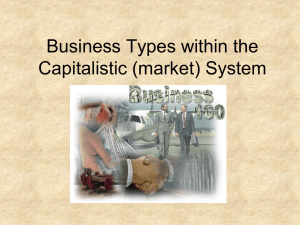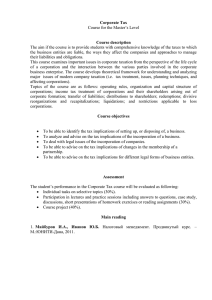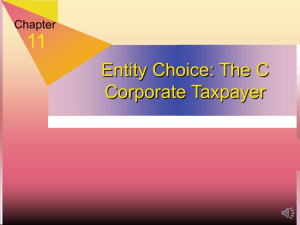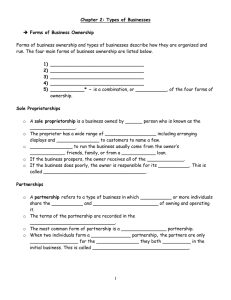CORPORATE GOVERNANCE Boards of directors elected by the shareholders are legally
advertisement
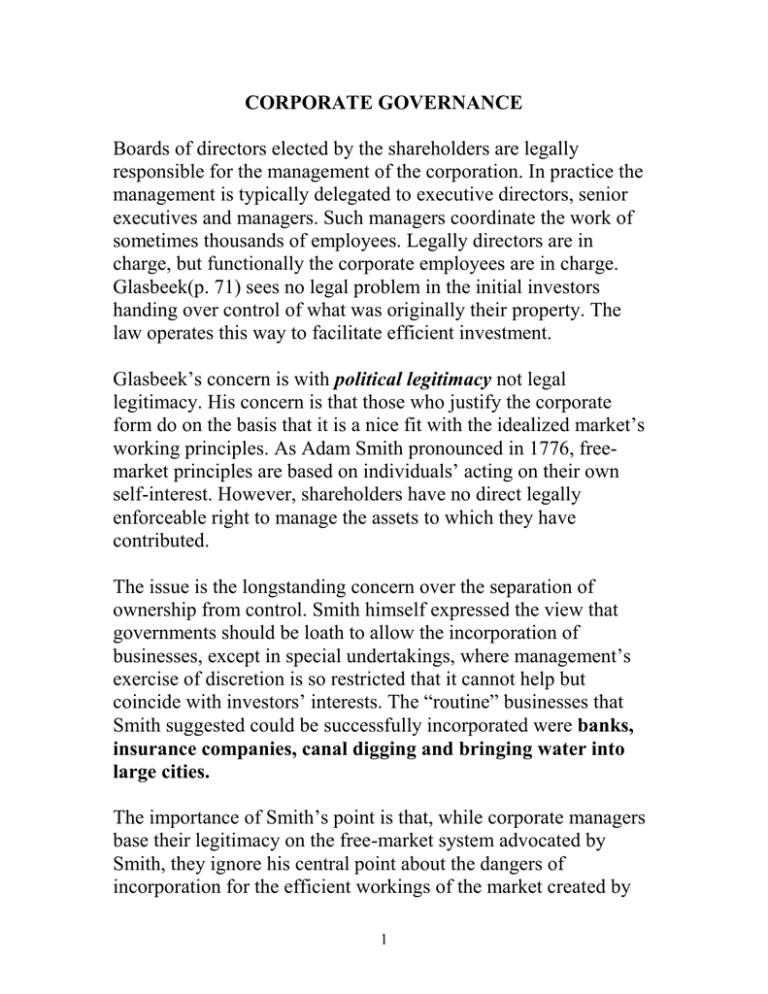
CORPORATE GOVERNANCE Boards of directors elected by the shareholders are legally responsible for the management of the corporation. In practice the management is typically delegated to executive directors, senior executives and managers. Such managers coordinate the work of sometimes thousands of employees. Legally directors are in charge, but functionally the corporate employees are in charge. Glasbeek(p. 71) sees no legal problem in the initial investors handing over control of what was originally their property. The law operates this way to facilitate efficient investment. Glasbeek’s concern is with political legitimacy not legal legitimacy. His concern is that those who justify the corporate form do on the basis that it is a nice fit with the idealized market’s working principles. As Adam Smith pronounced in 1776, freemarket principles are based on individuals’ acting on their own self-interest. However, shareholders have no direct legally enforceable right to manage the assets to which they have contributed. The issue is the longstanding concern over the separation of ownership from control. Smith himself expressed the view that governments should be loath to allow the incorporation of businesses, except in special undertakings, where management’s exercise of discretion is so restricted that it cannot help but coincide with investors’ interests. The “routine” businesses that Smith suggested could be successfully incorporated were banks, insurance companies, canal digging and bringing water into large cities. The importance of Smith’s point is that, while corporate managers base their legitimacy on the free-market system advocated by Smith, they ignore his central point about the dangers of incorporation for the efficient workings of the market created by 1 separation of ownership and control. In 1932, A.A. Berle and G.C. Means re-identified this as a core problem of corporate law. Their study of US corporations underpinned their conclusion that ownership without control and control without ownership were problems of corporate structures. The authors saw the system as producing increasingly passive investors, who would abandon the company rather than discipline management. This went against Smith’s idealized market. Debates since the Berle and Means study have emerged between “liberal social engineers” and “orthodox capitalist”. The former see the corporate form as being not a true market institution and one that should be used and regulated for social purposes other than pure profiteering. In contrast, the orthodox capitalist call is for restoration of the legitimacy of the corporation with the single goal of making profits. The orthodox capitalists of the school of law and economics deny that corporations are anti-market in structure. They see no loss of control by owners of capital who invest in publicly traded corporations. Essentially, they see the legal duties imposed by corporate law on managers of corporations as embodying the implicit contractual terms that investors have with the corporate managers. There appears to be no evidence to support this. Glasbeek notes further that, just as investors are assumed to be entirely self-interested individuals, so should managers of the corporations be assumed to be self-interested. Accordingly, investors should be fearful of managers not acting in the interest of the former where it is not consistent with the self-interest of managers. Such fear is amplified when managers are afforded wide discretion to act. The legal instructions to managers are “take reasonable care to act 2 in the best interests of the corporation.” This is vague. The interests of different shareholders can differ. Some want short term gains, some want long term gains. Should the interests of future shareholders be considered? The danger is that self-interested directors or managers will place their own self-interest before that of the corporation but without detection or remedy by the courts. It may be argued that this will be remedied by a fall in share values. Thus the market will detect and resolve the inefficient or selfinterested actions of managers. This may be plausible for some institutional investor shareholders, such as pension funds, who can detect inefficiency and use market power to replace management. Is there evidence of institutional investors using their disciplinary power? Typically individual small shareholders have no power to discipline or replace management. There are some actions shareholders can take if they believe management is not acting in the best interests of the corporation. (a) they can get the corporation to sue abusing or neglectful managers; at times they have power of principals over agents; (b) they can be bought out at a fair price if they dissent to directors’ decisions; the directors may argue that they were acting in the interests of corporations; (c) there is also the oppression remedy where shareholders demonstrate they have been unfairly treated or discriminated against by directors, managers or the corporation; (d) there is also the fiduciary duty of directors and managers to put corporation’s and shareholders’ interests first before their own. 3 The problem is the vagueness and flexibility of such rules. Their existence does indicate a problem in the corporate form of separating ownership from control. Technical solutions have been attempted. Glasbeek suggests the entire conception of corporations requires consideration. A major concern is the de facto lack of accountability of officer and directors to minority shareholders. The role of employees The business form workers cooperative is permitted and regulated by law in Canada. While workers' cooperatives do not come close to matching large corporations as accumulators of capital, they do offer the possibility of greater accountability of managers to other stakeholders, than that afforded by the corporate form. The form of a workers' cooperative does not preclude incorporation. For example the Mondragon (Spain) cooperatives are incorporated. However, such cooperatives have a structure and procedures that render managers accountable to the owners (workers) through a workers' council in which each member has one vote. While the iron law of oligarchy tends to operate, with decisions made by a few people, the workers' co-op system does offer some checks by the owners of the business upon those who exercise control of decisions. Some workers in Canada do influence their working conditions by negotiating collective agreements with management. However, collective bargaining must focus exclusively on the terms and conditions of employment. It is not open to a workers' union to contribute to the decision whether a proposed closing down of the plant will take place, or whether the CEO should be fired and provided with a golden parachute. Some corporations remunerate employees with company shares. While this may encourage employees to work harder and more efficiently, such arrangements rarely provide workers with the power to challenge managerial decision making because minority shareholders have typically no 4 significant role to play in the management of corporations. Furthermore, workers are by tradition and law bound to obey managerial rules and directives provided they are reasonable, certain and known. Why do Canadian workers have no legal right, as workers, to decide on matters of company policy? One presumes that an important factor is the traditional cultural view of workers as unimportant, as suggested by the Master Servant legislation that regulated work relations in the 19th Century. Workers, too, are often viewed as commodities merely to be bought and sold in the labour market. While the National Labor Relations Act (NLRA) that accompanied Franklin D. Roosevelt's New Deal was intended to establish partnership between workers and management, such partnership did not materialize because employers refused to bargain items that they considered to be "management rights". In particular managers guarded jealously their "right" to determine how work is performed. See *** Workers are viewed as inferior to management with respect to performance of work, even in professional workplaces such as schools, universities, hospitals, fire and ambulance services and other workplaces with high levels of professional knowledge on the part of workers. Is there justification for excluding workers from a role in the management of corporations? Arguments for their exclusion are that workers do not take the financial risks of investors and shareholders. While this is true, workers do take risks of workplace injuries and resulting incapacity. It is not clear that risks of financial loss experienced by shareholders should be treated as more important than risks of physical and mental harm that are experienced by employees. It is also argued that workers have the right to exit a workplace, 5 merely by providing reasonable notice of such exit. While this is true, its relevance is unclear. Directors, officers, and managers are all entitled to leave an organization but retain the right to manage it. It is not immediately obvious why a worker's right to leave the organization would justify his /her exclusion from the process of managing the organization, through elected representatives. Glasbeek argues workers should have more participation and power in the management of the organizations for whom they work. He notes the success of worker/management joint committees in Europe, particularly Germany. The Westray mine disaster of 1992 illustrates not only illegal management practices but the lack of government supervision and enforcement of safety regulations, that could have been checked by a governance role of workers through their elected representatives. In Canada, one or two persons own the majority of shares of 80% of publicly traded corporations. Minority shareholders are the overwhelming number of persons, yet have no role in the management of their corporations. Add to this the exclusion of workers from governance in corporations and the apparent increasing incidence of illegal or unethical management practices (Bre X, Enron, Westray, Hollinger are examples) and there may be a case for bringing changes in the governance of corporations. 6

